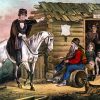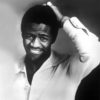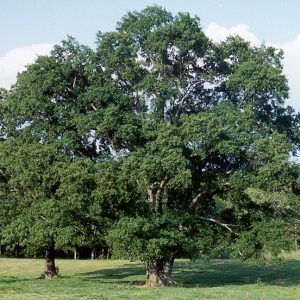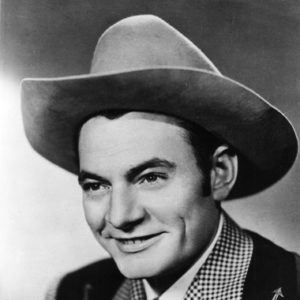calsfoundation@cals.org
T. Texas Tyler (1916–1972)
aka: David Luke Myrick
T. Texas Tyler, the charismatic Arkansas native with a growling voice, initiated a distinctive country and western musical style that made him a success in the recording industry and on stage in the 1940s, 1950s, and into the 1960s. He pioneered a storytelling style in which the performer spoke some or all of the lyrics, later employed by other country stars such as “Red” Sovine, Jimmy Dean, “Whispering” Bill Anderson, and others. Tex Ritter, one of Tyler’s contemporaries, often referred to the influence Tyler’s style had on him.
Tyler was born David Luke Myrick in Mena (Polk County) on June 20, 1916. His parents were James E. Myrick and Ida Bell Cagle Myrick. He was the youngest of three brothers. His childhood years were difficult, as the Myrick household had no electricity, no indoor plumbing, and very little furniture. His parents did menial jobs and sold eggs, butter, and vegetables on the side. The children were expected to help. His mother worked as a housekeeper, took in laundry from local families, and cared for other people’s children.
Myrick never finished the eighth grade, and his teachers recalled he was often truant, either from lack of interest or from having to help with family chores. During these years, he developed an interest in music. Teaching himself on a Sears Roebuck guitar (he often commented that it cost $3.98, including postage), he soon became good enough to perform in local talent shows and at dances. He left home in 1932 at age sixteen, going to Newport, Rhode Island, to live with a brother who was stationed there with the U.S. Navy.
While living with his brother in the early 1930s, he obtained a non-paying program on WMBA in Newport. For the next four or five years, he traveled around the country, spending short periods at a variety of radio stations. Myrick appeared on the popular Major Bowes Amateur Hour radio program in 1935 while in West Virginia, and his rendition of “Silver Haired Daddy” won first place in that week’s contest, jump-starting his entertainment career. He toured with one of Major Bowes’s units for the next several weeks. Myrick had been using “Ozark Mountain Dave” as a stage name, but Bowes convinced him to change it to “Texas Tyler,” combining the names of cowboy singers Tex Ritter and Tom Tyler. A few years later, Tyler sang a song called “I was Only Teasing You,” and an announcer introduced him as the “Teasing singer ‘T’. Texas Tyler”; the “T” became part of his stage name from that point on.
In early 1939, Tyler went to WCHS Charleston, West Virginia, where he entered into a partnership with a young fiddler named Clarence “Slim” Clere. The duo of Slim and Tex worked together for three years in Charleston and in Huntington, West Virginia. While in Huntington, he met and married Claudia Foster in 1942.
Tyler and Clere soon split up, and Tyler went to WMMN in Fairmont, West Virginia, where he worked individually and also with Little Jimmy Dickens. Soon thereafter, he won a spot on KWKH in Shreveport, Louisiana. He was at WIBC in Indianapolis, Indiana, when World War II interrupted his fledgling career; he served in the army until the war ended.
After his discharge in 1946, Tyler went to southern California and organized a band. He signed a contract with a small but growing Pasadena record label, 4 Star. With his distinctive growl accompanied by brash honky-tonk instrumentation, he soon had some moderate hits with covers of “Filipino Baby,” “Remember Me,” and “Oklahoma Hills.” His 1948 “Deck of Cards” topped the charts, and its recitative style was widely imitated. His next hit was “Dad Gave My Dog Away.” By 1949, he had his own Los Angeles television show, The Range Roundup.
Tyler was soon voted by disc jockeys as one of the top country performers in the United States. In 1950, Country Song Roundup magazine voted his television program the best country music show of the year. He performed at Carnegie Hall in New York City and was cast in two western movies—the 1949 “Durango Kid” (Charles Starrett) Columbia production Horsemen of the Sierras, and the 1950 Roy Rogers Republic production, Twilight in the Sierras. He appeared often on the Grand Ole Opry, the Louisiana Hayride, and the Country Jamboree radio programs. His hits “Divorce Me C. O. D.” and “My Bucket’s Got a Hole in It” (a cover of the Hank Williams song) perpetuated his fame.
The advent of rock and roll sent his personal and professional life into a slump. He was arrested in Texas on marijuana possession in the mid-1950s, and alcohol abuse added to his many problems. His last hit was in 1953 with “Courtin’ in the Rain.” In 1958, Tyler had a religious experience when he attended the Foursquare Gospel Church in Long Beach, California, and turned to evangelism and gospel music, becoming a licensed Assembly of God minister. He made gospel albums which he sold at revivals and at other church services. In April 1968, his wife, Claudia, died, and one year later, his mother died at age ninety-five. Two years later, Tyler married Doria, a Canadian he often described as “a wonderful Christian lady.” They soon settled in Springfield Missouri, where he continued to speak in churches.
In 1971, radio personality Paul Harvey announced to his listeners that T. Texas Tyler had cancer of the stomach and had only a short time to live. Later, from Cox Medical Center in Springfield, Tyler confirmed the report in letters sent to churches, in which he encouraged them to buy his records so that he could pay his mounting medical bills.
“The man with a million friends,” who had held services in churches across America and in Canada, died on January 23, 1972, in Springfield. He is buried in Huntington, West Virginia.
For additional information:
Coogan, Harold. “T. Texas Tyler: Singer, Guitarist, Band Leader & Songwriter.” The Looking Glass 15 (February 1990): 9–13.
Obituary of T. Texas Tyler. Mena Evening Star, January 24, 1972, p. 4
Shestack, Melvin. The Country Music Encyclopedia. New York: T. Y. Crowell Printers, 1977.
Stamble, Irwin, and Grelun Landon. The Encyclopedia of Folk, Country and Western Music. New York: St. Martin’s Press, 1983.
Harold Coogan
Mena, Arkansas
This entry, originally published in Arkansas Biography: A Collection of Notable Lives, appears in the CALS Encyclopedia of Arkansas in an altered form. Arkansas Biography is available from the University of Arkansas Press.
 Arts, Culture, and Entertainment
Arts, Culture, and Entertainment Music and Musicians
Music and Musicians World War II through the Faubus Era, 1941 through 1967
World War II through the Faubus Era, 1941 through 1967 T. Texas Tyler Tree
T. Texas Tyler Tree  T. Texas Tyler
T. Texas Tyler  T. Texas Tyler
T. Texas Tyler 




I now have all four star acetates and reel-to-reel tapes, as well as all company files with recording dates.
His story is far from complete. Tyler made his first recordings for the Black & White label in 1945 and later on in 1945, he made the move to 4 Star. His later recordings for that label were issued by Decca. His contract with 4 Star ended ca. 1956/1957. He made two albums for Capitol in 1962 and 1965, and in 1966 he recorded 14 songs for the Starday label. At least three albums are known (private press) with religious songs TTT recorded after his stint with Starday. Sorry to see that his 4 Star recordings are so very badly registered in files. There are a lot of open spaces in the recording dates, but there are also a lot of songs we don’t know the recording dates from.